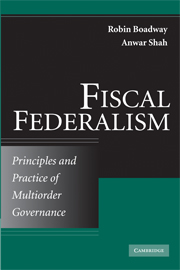Book contents
- Frontmatter
- Contents
- Preface
- PART ONE DESIGNING FISCAL CONSTITUTIONS
- PART TWO REVENUE SHARING AND FISCAL TRANSFERS
- PART THREE FINANCE AND PROVISION OF PUBLIC SERVICES
- PART FOUR CHALLENGES AND RESPONSES
- 14 Fiscal Federalism and Macroeconomic Governance
- 15 Interregional Competition and Policies for Regional Cohesion and Convergence
- 16 Decentralized Governance and Corruption
- 17 Adapting to a Changing World
- References
- Index
17 - Adapting to a Changing World
Published online by Cambridge University Press: 05 June 2012
- Frontmatter
- Contents
- Preface
- PART ONE DESIGNING FISCAL CONSTITUTIONS
- PART TWO REVENUE SHARING AND FISCAL TRANSFERS
- PART THREE FINANCE AND PROVISION OF PUBLIC SERVICES
- PART FOUR CHALLENGES AND RESPONSES
- 14 Fiscal Federalism and Macroeconomic Governance
- 15 Interregional Competition and Policies for Regional Cohesion and Convergence
- 16 Decentralized Governance and Corruption
- 17 Adapting to a Changing World
- References
- Index
Summary
Globalization and the information revolution are profoundly influencing economic governance in both the industrial and the industrializing world. Globalization has lifted millions of people out of poverty, and the information revolution has brought about a degree of citizen empowerment and activism in state affairs that is unparalleled in past history. They have also acted as catalysts for “reshuffling” government functions within and beyond nation-states (Friedman, 1999; Courchene, 2001; Castells, 1998) and, in some cases, for creating new states from existing ones. Because of globalization, it is increasingly apparent that “the nation-state is becoming too small for the big problems of life, and too big for the small problems of life” (Bell, 1987: 13–14). In other words, nation-states are gradually losing control of some of their customary areas of authority and regulation, including macroeconomic policy, corporate taxation, external trade, environment policy, telecommunications, and financial transactions. Globalization is also making small, open economies vulnerable to the whims of large hedge funds and polarizing the distribution of income in favor of skilled workers and regions and against those with lower skills and access to information, thus widening income disparities within nations while improving the levels of incomes. Because of the information revolution, governments have less ability to control the flow of goods and services, ideas, and cultural products. The twin forces of globalization and the information revolution are also strengthening localization, reinforcing the consequences of the growing urbanization of population worldwide.
- Type
- Chapter
- Information
- Fiscal FederalismPrinciples and Practice of Multiorder Governance, pp. 538 - 556Publisher: Cambridge University PressPrint publication year: 2009



